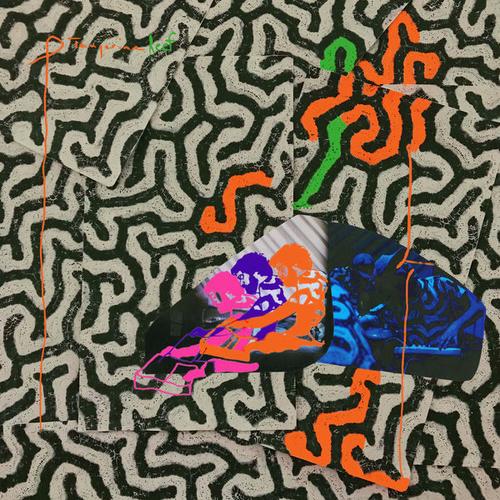Tangerine Reef - Animal Collective
$
10.99
$
4.99
When Animal Collective began as a crew of closely knit teenage friends in the mid-'90s, one of the primary influences on their early style was the eerie and disorienting tension of horror movie soundtracks.
This early influence would go on to touch parts of every album as the band developed, and given their love of film and soundtracks from early on, it's no surprise that the group eventually branched out into visual albums -- interconnected film/audio material that shares themes, movements, and subject matter.
Following their 2011 visual album, ODDSAC, 2018's Tangerine Reef finds Animal Collective collaborating with Coral Morphologic, a Miami-based group that merges marine biology with conceptual art.
The result is a lengthy and drifting meditation on environmental issues, with undercurrents of oceanic conservation and climate change anxiety being suggested but never overtly communicated.
Sonically, Tangerine Reef is underwater-sounding even by Animal Collective's washed-out standards.
Taken separately from their visual counterparts, the 13 pieces here wander nonstop through a mostly beatless and dreamy ambience.
The band's modular lineup means members occasionally sit sessions out, and the pop-minded Panda Bear is palpably absent, his signature vocal harmonies and soaring melodies missing from this subdued set.
Vocals (handled solely by Avey Tare) are largely obscured for most of the album, and lyrics are hard to make out when they do rise up enough in the mix to be discerned.
Tangerine Reef's singular aquatic flow seems to be more concerned with exploring the textures and subtleties of these slow sounds than fleshing out traditional songs of any kind.
Much like the earliest Animal Collective releases, the lines between structured composition and improvisation are blurry, with samples lingering longer than expected, lyrics mumbled or trailing off, and the group coming together in a lush haziness.
Designed to soundtrack footage of underwater exploration, the music here is abstract and slightly sad, with pieces like "Palythoa" and "Hair Cutter" coming closest to known songs but still shifting and mercurial.
Fans of the band's more accessible material might be puzzled or put off by Tangerine Reef, but those partial to the formless drift of something like 2003's Campfire Songs will find threads of the same magic here.
Like any visual album, the floating sounds here are probably best experienced in conjunction with the visuals they were created for, but even on their own, there's a calm power that grows as the various passages of Tangerine Reef fade in and out of one another.
| Title/Composers | Performer | Listen | Time | Size | Size | |
|---|---|---|---|---|---|---|
| 1 | Hair Cutter | Animal Collective | Play | 04:01 | 9 MB | 0 MB |
| 2 | Buffalo Tomato | Animal Collective | Play | 04:49 | 11 MB | 0 MB |
| 3 | Inspector Gadget | Animal Collective | Play | 04:19 | 9 MB | 0 MB |
| 4 | Buxom | Animal Collective | Play | 04:40 | 10 MB | 0 MB |
| 5 | Coral Understanding | Animal Collective | Play | 03:44 | 8 MB | 0 MB |
| 6 | Airpipe (To a New Transition) | Animal Collective | Play | 06:03 | 13 MB | 0 MB |
| 7 | Jake and Me | Animal Collective | Play | 04:25 | 10 MB | 0 MB |
| 8 | Coral by Numbers | Animal Collective | Play | 02:26 | 5 MB | 0 MB |
| 9 | Hip Sponge | Animal Collective | Play | 03:53 | 8 MB | 0 MB |
| 10 | Coral Realization | Animal Collective | Play | 03:00 | 6 MB | 0 MB |
| 11 | Lundsten Coral | Animal Collective | Play | 03:05 | 7 MB | 0 MB |
| 12 | Palythoa | Animal Collective | Play | 04:11 | 9 MB | 0 MB |
| 13 | Best of Times (Worst of All) | Animal Collective | Play | 04:09 | 9 MB | 0 MB |
| 52 mins | 121 MB | |||||
| 0 mins | 0 MB | |||||
| Artist | Job | |
|---|---|---|
| 1 | Animal Collective | Primary Artist |
Animal Collective
| Quality | Format | Encoding | Description |
|---|---|---|---|
| Standard | MP3 | 320kps 44.1kHz | MP3 is an audio coding format which uses a form of lossy data compression. The highest bitrate of this format is 320kbps (kbit/s). MP3 Digital audio takes less amount of space (up to 90% reduction in size) and the quality is not as good as the original one. |
| CD Quality | FLAC | 16bit 44.1kHz | FLAC is an audio coding format which uses lossless compression. Digital audio in FLAC format has a smaller size and retains the same quality of the original Compact Disc (CD). |







